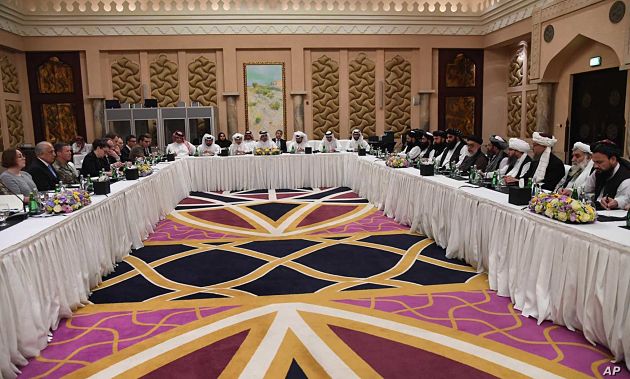Commenting on the signing of an agreement between the United States and the Taliban, which was enthusiastically received by many of our readers, “Voice of Islam” first wrote that it was too early to consider it a final success for the Taliban. We continue to report on the deteriorating and confusing situation inside Afghanistan. However, the text of the American-Russian memorandum signed on February 29 in Qatar in connection with the agreement between the United States and the Taliban is also interesting in this regard. We have translated the main points and provide the original English text at the end of the article.
“Representatives of the United States and Russia:
- Welcome the agreement between the United States and the Taliban as a necessary step to end the war and begin an intra-Afghan dialogue;
- Express their commitment to working with all Afghans, including the Government of the Islamic Republic of Afghanistan, political leaders, civil society, and the Taliban, to achieve a peaceful settlement, an end to the war, regional stability, and global security;
- Affirm that a comprehensive and lasting peace can only be achieved on the basis of an agreement among all Afghans;
- Reaffirm that the Islamic Emirate of Afghanistan is not recognized by the international community and the United States, and that they will not support its restoration;
- Call on the Taliban to join the political process and contribute to the intra-Afghan dialogue and the post-war reconstruction of Afghanistan;
- Call on all parties to reduce violence in order to facilitate intra-Afghan dialogue;
- Urge the Taliban to take steps to ensure that Afghanistan is not used by Al-Qaeda, ISIS and other international terrorist groups to threaten other countries;
- Expect all parties to jointly monitor compliance with the cease-fire;
- Call on all Afghans to immediately begin discussions on urgent issues such as the release of prisoners from all sides;
- Express the intention to provide political and economic support to Afghanistan, subject to respect for the rights of all segments of the population, including women, youth and minorities, and the preservation of the gains made since 2001;
- Express willingness to reconsider the status of participants in the process (presence on terrorist lists, sanctions), including the Taliban, depending on their behaviour, including in the intra-Afghan dialogue;
- Call on all countries to support Afghanistan in achieving peace for the common interest of all.”
So, what stands out in this text and what can be deduced from it? Two points.
First, the Americans have no intention of handing Afghanistan over to the Taliban, and starting with the agreement, in which any mention of the Islamic Emirate of Afghanistan (IEA) is accompanied by a statement that the United States does not recognize it as a state, they emphasize that the Taliban should recognize the framework of the current Islamic Republic of Afghanistan (IRA) and operate within it, rather than trying to regain their authority. The sections on Afghanistan’s future identify the current IRA authorities, certain political leaders, and civil society as the forces that should determine it, ahead of the Taliban. Support for Afghanistan is conditioned on the preservation of the gains made since 2001, including the rights of women, youth, and various minorities.
Finally, it is explicitly stated that the future relationship with the Taliban will depend on how they treat the Afghan authorities, although it is not mentioned whether the Afghan authorities should at least respect the Taliban as dialogue partners.
Second, why is Russia involved, since the agreement with the Taliban will be signed by the United States? Let’s consider three facts:
- The United States wants the future of Afghanistan after its withdrawal to look a certain way, in which the Taliban does not determine it, but recognizes the established rules of the game.
- There is a high probability that the Taliban, having fought for one and a half decades and sacrificed tens of thousands of lives, will not accept the role assigned to them.
- The United States does not want to continue fighting for the future of Afghanistan that it would like to see with its own resources.
So what is Russia’s role here? The most logical explanation is that they can take on the burden of fighting for a secular future for Afghanistan. The United States, with its economic capabilities, cannot afford to pay for ambitious foreign policy goals and is gradually beginning to reduce its expensive presence around the world. It’s a different story with Russia – a generous nation! In recent years they have been involved everywhere they can, from Syria to Libya and the Central African Republic. The Russians are such a wealthy nation that, unlike the Americans, they can afford to pay for Russia’s role as the world’s policeman. Or maybe no one is asking them.
* Recognized as terrorist organizations in Russia.

